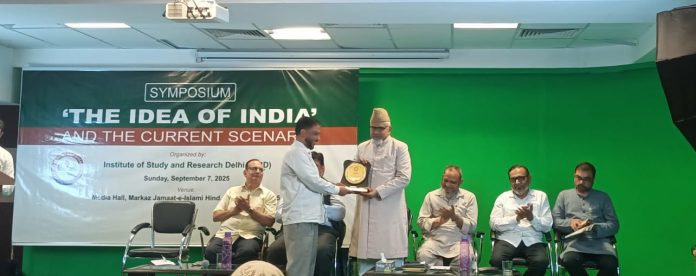New Delhi: The Institute of Study and Research Delhi (ISRD), in collaboration with Jamaat-e-Islami Hind (JIH), organized a symposium on “The Idea of India and the Current Scenario” at the JIH headquarters on Sunday. The event gathered academicians, researchers, journalists, media professionals, Ph.D. scholars, civil society leaders, and members of the public concerned about India’s plural heritage and contemporary challenges.
The discussions examined India as a civilizational, cultural, and political construct shaped by centuries of interaction among diverse traditions. Speakers highlighted the contributions of Muslim and other scholars, thinkers, and leaders to India’s intellectual, social, and political life. Central to the event was the issue of protecting India’s plural identity and constitutional ethos in the face of increasing polarization.
Presiding over the programme, JIH Vice President Salim Engineer warned that internal threats posed greater dangers to Indian democracy than external ones. He argued that attempts to weaken unity, equality, and democratic values were undermining the foundations of the Republic. He stressed that the Constitution’s four guiding principles, equality, liberty, justice, and fraternity, were under strain. Freedom of speech was often branded as “anti-national,” and dissenters faced imprisonment. He said that the judiciary and media, once seen as independent institutions, were now operating under pressure.
Salim also referred to historic assaults on democratic values, including the assassination of Mahatma Gandhi in 1948, the Sikh genocide of 1984, the Babri Masjid demolition in 1992, and the Gujarat riots of 2002. He described these as systemic efforts to weaken the constitutional framework. As remedies, he called for raising citizen awareness, strengthening independent media, ensuring impartial judiciary, and encouraging debate in educational institutions. He stressed the participation of women, Dalits, tribals, and youth in defending democratic values.
S.Q.R. Ilyas, spokesperson of the All India Muslim Personal Law Board, reminded participants of the founding vision of India as laid down in the Constitution. He emphasized that secularism, democracy, equality, and fraternity were its pillars, ensuring equal rights for all citizens. He said that the welfare state model, which guaranteed social justice, reservations, and minority protections, was now under threat from efforts to impose cultural and religious uniformity, weaken federalism, and push discriminatory laws.
Senior journalist Asad Mirza spoke on the media’s role in defending democracy. Advocate Aslam Ahmed highlighted legal avenues to resist constitutional erosion. Journalist Naveen Kumar described the present state of affairs as “bhayaavah” (horrific) and called for urgent corrective steps. JIH Delhi President Salimullah Khan underscored the importance of civil society in restoring trust and harmony.
Asif Iqbal, convenor of the symposium, stressed the need for interdisciplinary dialogue on nationhood and pluralism. The gathering concluded with a collective resolve to defend India’s inclusive and democratic framework, reaffirming that the nation’s greatest strength lies in its unity and composite heritage.




